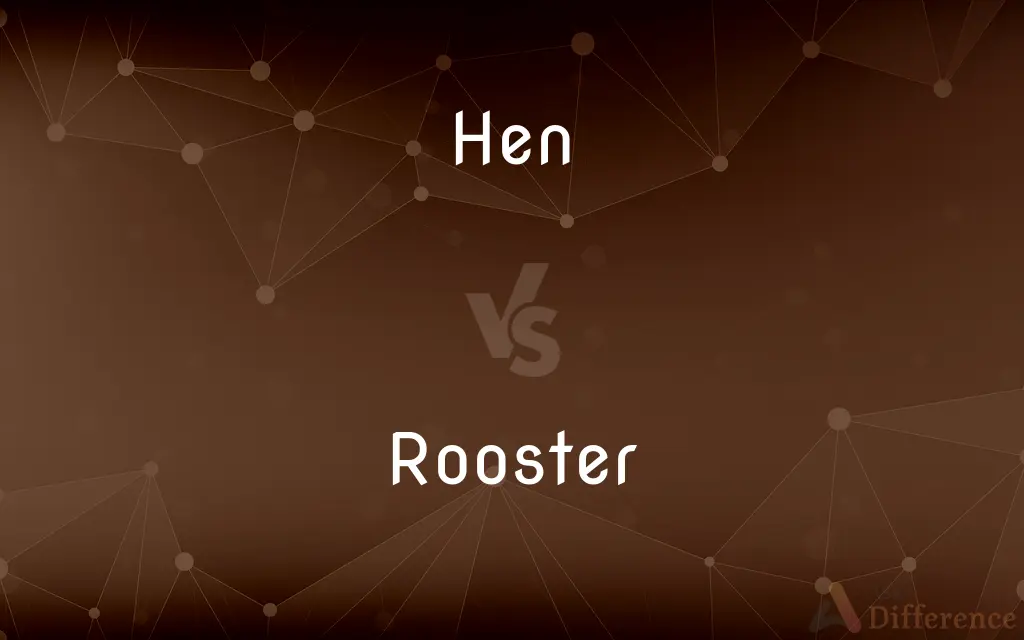Hen vs. Rooster — What's the Difference?
By Urooj Arif & Fiza Rafique — Updated on March 8, 2024
A hen is a female chicken, known for laying eggs, while a rooster is a male chicken, recognized by its distinctive crowing and bright plumage.

Difference Between Hen and Rooster
Table of Contents
ADVERTISEMENT
Key Differences
Hens are female chickens that play a crucial role in the reproduction process by laying eggs. From the point of maturity, which varies by breed but is typically around 5 to 6 months of age, hens can lay eggs, with or without the presence of a rooster. Roosters, the male chickens, are often larger than hens, with more vibrant feathers, especially in the tail and neck region (hackles), and they possess larger combs and wattles, which can be more brightly colored.
A key behavioral difference is that roosters are known for their crowing, a loud vocalization typically occurring at dawn but can happen at any time of day. Hens can also make a variety of sounds, including clucking, especially after laying an egg (known as the "egg song"), but they do not crow. Roosters often serve as flock protectors, using their crowing to assert territory and their physical strength to protect against predators or threats.
Physically, roosters have spurs on the backs of their legs, which are used in defense and during fights with other roosters. While some hens may develop small spurs, they are generally not as prominent or sharp as those found on roosters. The purpose of a hen in a flock is primarily to lay eggs, while a rooster's role includes fertilizing eggs and protecting the flock.
In terms of social structure, roosters may exhibit more dominant and aggressive behavior, which is part of establishing and maintaining the pecking order within a flock. Hens can also show a pecking order but are generally less aggressive than roosters.
Comparison Chart
Role
Egg laying, nurturing chicks.
Fertilizing eggs, flock protection, territory assertion.
ADVERTISEMENT
Physical Features
Smaller combs and wattles, less vibrant feathers.
Larger, more colorful combs and wattles, vibrant tail and neck feathers.
Behavior
Clucking, less aggressive.
Crowing, more aggressive, territorial.
Reproduction
Can lay eggs without a rooster, eggs unfertilized.
Necessary for egg fertilization.
Social Structure
Part of the pecking order, generally less dominant.
Often establishes dominance within the flock.
Compare with Definitions
Hen
Mature hens lay eggs regularly, even without a rooster.
A healthy hen can lay an egg almost daily during her peak laying years.
Rooster
Known for their distinctive crow at dawn and other times.
Roosters crow to assert territory and communicate with the flock.
Hen
Generally smaller combs and wattles, less flashy plumage.
Hens typically have more subdued feather colors for camouflage.
Rooster
Larger combs and wattles, more vibrant plumage.
Roosters often have striking feather patterns and colors for display.
Hen
Clucking, especially notable after laying an egg.
Hens often perform the egg song or clucking after laying an egg.
Rooster
Use spurs for fighting and protection.
Roosters may defend the flock from predators or threats with their spurs.
Hen
Less aggressive, with a distinct pecking order.
Hens establish a social hierarchy but with less aggression compared to roosters.
Rooster
Necessary for the fertilization of eggs.
Only eggs fertilized by a rooster can hatch into chicks.
Hen
Primary egg layers, can show nurturing behavior towards chicks.
Hens may brood or sit on eggs to incubate them, whether fertilized or not.
Rooster
More likely to show aggressive behavior to establish pecking order.
Roosters can be aggressive towards other roosters and sometimes humans to maintain dominance.
Hen
The female of certain aquatic animals, such as an octopus or lobster.
Rooster
A person regarded as cocky or pugnacious.
Hen
Often Offensive Slang A usually older woman, especially one who is engaged in conversation with other women.
Rooster
A male domestic chicken (Gallus gallus domesticus) or other gallinaceous bird.
Hen
(uncommon) A female fish (especially a salmon or trout) or crustacean.
Rooster
A bird or bat which roosts or is roosting.
Hen
A woman, particularly
Rooster
An informer.
Hen
A bride-to-be, particularly in the context of her "hen night" festivities.
Rooster
A violent or disorderly person.
Hen
A hen night.
Rooster
(figuratively) A powerful, prideful, or pompous person.
Hen
An affectionate term of address used to women or girls.
Don't cry, hen. Everything will be all right.
Rooster
A man.
Hen
The hard clam (Mercenaria mercenaria), a bivalve shellfish.
Rooster
A wild violet, when used in a children's game based on cockfighting.
Hen
(dialectal) Hence.
Rooster
Legislation solely devised to benefit the legislators proposing it.
Hen
(dialectal) To throw.
Rooster
The male of the domestic fowl; a cock.
Nor, when they [the Skinners and Cow Boys] wrung the neck of a rooster, did they trouble their heads whether he crowed for Congress or King George.
Hen
The female of the domestic fowl; also, the female of grouse, pheasants, or any kind of birds; as, the heath hen; the gray hen.
Hen
Female of certain aquatic animals e.g. octopus or lobster
Common Curiosities
Can hens lay eggs without a rooster?
Yes, hens can lay eggs without a rooster, but these eggs will be unfertilized and cannot hatch into chicks.
What are the spurs on a rooster for?
Spurs are used for fighting, either in defense of the flock from predators or in aggression towards other roosters.
Why do roosters crow?
Roosters crow to assert their territory, signal their presence to the flock, and often as a response to environmental cues like light.
Do hens have a role besides laying eggs?
Hens can also exhibit nurturing behavior, particularly if they incubate eggs or care for chicks.
Is it necessary to have a rooster for hens to lay eggs?
No, hens do not require a rooster to lay eggs, but a rooster is needed for eggs to be fertilized.
How does the presence of a rooster affect a flock?
A rooster can provide protection and can also impact the social dynamics and pecking order of the flock.
Can you keep a flock of chickens without a rooster?
Yes, a flock can consist solely of hens, which will continue to lay unfertilized eggs.
Why are rooster feathers more colorful than hen feathers?
The vibrant feathers of roosters are used for display during mating rituals and to establish dominance.
Can all hens brood eggs?
Not all hens have a strong instinct to brood; this can vary by individual and breed.
How can you differentiate a hen from a rooster?
Besides behavioral differences like crowing, physical traits such as the size and color of combs and wattles, plumage, and the presence of spurs can help distinguish a rooster from a hen.
Share Your Discovery

Previous Comparison
Characteristic vs. Personality
Next Comparison
Jug vs. MugAuthor Spotlight
Written by
Urooj ArifUrooj is a skilled content writer at Ask Difference, known for her exceptional ability to simplify complex topics into engaging and informative content. With a passion for research and a flair for clear, concise writing, she consistently delivers articles that resonate with our diverse audience.
Co-written by
Fiza RafiqueFiza Rafique is a skilled content writer at AskDifference.com, where she meticulously refines and enhances written pieces. Drawing from her vast editorial expertise, Fiza ensures clarity, accuracy, and precision in every article. Passionate about language, she continually seeks to elevate the quality of content for readers worldwide.














































